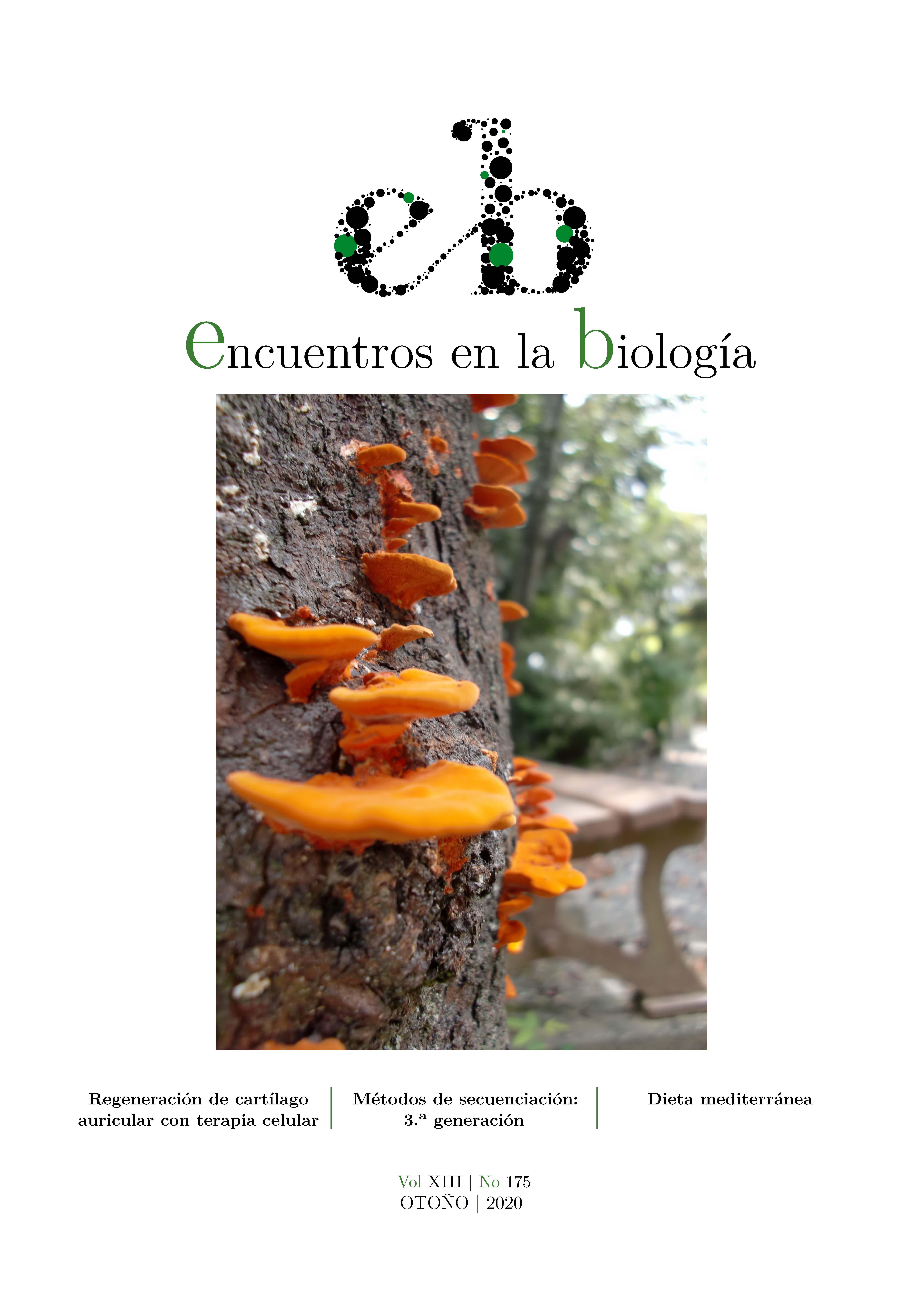La dieta mediterránea
DOI:
https://doi.org/10.24310/enbio.v13i175.17273Palabras clave:
Dieta mediterránea, compuestos bioactivos, fenoles, hidroxitirosol, terpenoides, ácidos grasos omega 3, antioxidantes, antiiflamatorio, cáncerResumen
La dieta mediterránea se correlaciona con un menor riesgo de padecer enfermedades cardiovasculares, cáncer, diabetes tipo 2, Alzheimer, entre otros. Estos efectos positivos en la salud pueden explicarse por la sinergia de compuestos bioactivos, vitaminas y ácidos grasos insaturados, presentes en distintos alimentos de la dieta. La mayoría de estos compuestos tienen acción antioxidante e intervienen en rutas de inflamación y de proliferación celular, de donde se deduce su función en la prevención de enfermedades. No obstante, los beneficios asociados a la dieta mediterránea no solo se deben al patrón dietético, sino también a otras costumbres saludables propias de la región mediterránea, como el ejercicio físico.
Descargas
Métricas
Publicación Facts
Perfil de revisores N/D
Información adicional autores
Indexado: {$indexList}
-
Indexado en
- Sociedad Académica/Grupo
- N/D
- Editora:
- Uma Editorial. Universidad de Málaga
Citas
Perez-Jimenez, F. et al. (13 de Mayo de 2005). International conference on the healthy effect of virgin olive oil. European Journal of Clinical Investigation, 35(7), 421-424.
Rodríguez, M. H., & Gallego, A. S. (1999). Tratado de nutrición. Ediciones Díaz de Santos. ISBN: 84-7978-387-7.
Serra-Majem, L. et al. (2019). Benefits of the Mediterranean diet: Epidemiological and molecular aspects. Molecular Aspects of Medicine, 67, 1-55.
Moreno-Agostino, D. et al. (2018). Mediterranean diet and well- being: evidence from a nationwide survey. Psychology & Health, 34(3), 321-335.
Davinelli, S. T. (2018). The potential nutrigeroprotective role of Mediterranean diet and its functional components on telomere length dynamics. Ageing Research Reviews, 49, 1-10.
Maruca, A. et al. (2019). The Mediterranean Diet as source of bioactive compounds with multi-targeting anti-cancer profile. European Journal of Medicinal Chemistry, 181, 1-23.
Pauwels, K. (2011). The Protective Effect of the Mediterranean Diet: Focus on Cancer and Cardiovascular Risk. Medical Prin- ciples and Practice, 20, 103-111.
Toss, A. & Cristofanilli, M. (2015). Molecular characterization and targeted therapeutic approaches in breast cancer. Breast cancer research, 17(60), 1-11.
Battino, M. et al. (2018). Relevance of functional foods in the Mediterranean diet: the role of olive oil, berries and honey in the prevention of cancer and cardiovascular diseases. Critical Reviews in Food Science and Nutrition, 59(6), 893-920.
Descargas
Publicado
Cómo citar
Número
Sección
Licencia
Esta obra está bajo licencia internacional Creative Commons Reconocimiento-NoComercial-CompartirIgual 4.0.
Esta revista provee acceso libre inmediato a su contenido bajo el principio de hacer disponible gratuitamente la investigación al público. Todos los contenidos publicados en Encuentros en la Bilogía están sujetos a la licencia Creative Commons Reconocimento-NoComercia-Compartirigual 4.0 cuyo texto completo puede consultar en <http://creativecommons.org/licenses/by-nc-sa/4.0>
Se pueden copiar, usar, difundir, transmitir y exponer públicamente, siempre que:
Se cite la autoría y la fuente original de su publicación (revista, editorial y URL de la obra).
No se usen para fines comerciales.
Se mencione la existencia y especificaciones de esta licencia de uso
Los derechos de autor son de dos clases: morales y patrimoniales. Los derechos morales son prerrogativas perpetuas, irrenunciables, intransferibles, inalienables, inembargables e imprescriptibles. De acuerdo con la legislación de derechos de autor, Encuentros en la Biología reconoce y respeta el derecho moral de los autores/as, así como la titularidad del derecho patrimonial, el cual será cedido a la Universidad de Málaga para su difusión en acceso abierto. Los derechos patrimoniales, se refieren a los beneficios que se obtienen por el uso o divulgación de las obras. Encuentros en la Biología se publica en open access y queda autorizada en exclusiva para realizar o autorizar por cualquier medio el uso, distribución, divulgación, reproducción, adaptación, traducción o transformación de la obra.
Es responsabilidad de los autores/as obtener los permisos necesarios de las imágenes que están sujetas a derechos de autor.
Los autores/as cuyas contribuciones sean aceptadas para su publicación en esta revista conservarán el derecho no exclusivo de utilizar sus contribuciones con fines académicos, de investigación y educativos, incluyendo el auto-archivo o depósito en repositorios de acceso abierto de cualquier tipo.
La edición electrónica de esta revista esta editada por la Editorial de la Universidad de Málaga (UmaEditorial), siendo necesario citar la procedencia en cualquier reproducción parcial o total.






